
Tools:
eclipse, MySQL, MySQL connection driver: mysql-connector-java-5.1.45.jar
1, Create a new java project and then create a new folder - libs (used to store various external packages)
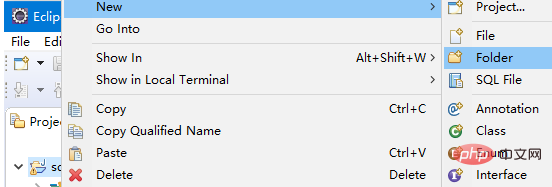
2. Add a connection to the mysql database in the package The package
is mysql-connector-java-5.1.45-bin.jar, then copy and paste it under the libs folder of our java project (note that it is in the physical address); at this time, in In eclipse—right-click the libs folder—Refresh, and put the downloaded JDBC into the folder, as shown in the following figure:
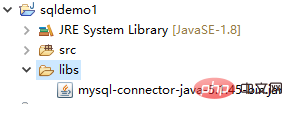
##3, Jar package on the build path
a. Click on the project - select Properties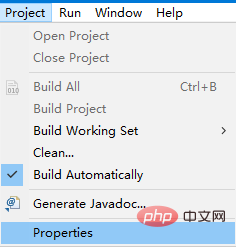
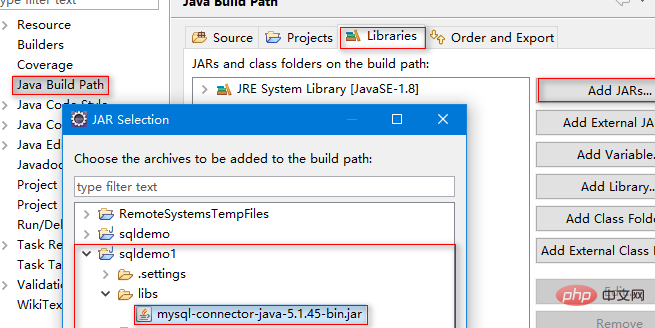
4. Connect the mysql database in the java project
Create two new Class class files in the java project package, which I named DBHelper and Demo
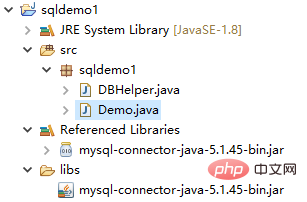
package sqldemo1;
import java.sql.Connection;
import java.sql.DriverManager;
import java.sql.PreparedStatement;
import java.sql.SQLException;
public class DBHelper {
public static final String url = "jdbc:mysql://127.0.0.1/student";
public static final String name = "com.mysql.jdbc.Driver";
public static final String user = "root";
public static final String password = "";
public Connection conn = null;
public PreparedStatement pst = null;
public DBHelper(String sql) {
try {
Class.forName(name);//指定連接類型
conn = DriverManager.getConnection(url,user,password);//獲取連接
pst = conn.prepareStatement(sql);//準(zhǔn)備執(zhí)行語(yǔ)句
} catch (Exception e) {
e.printStackTrace();
}
}
public void close() {
try {
this.conn.close();
this.pst.close();
} catch (SQLException e) {
e.printStackTrace();
}
}
}Write another Demo.java to execute related queries OperationThe code is as follows: package sqldemo1;
import java.sql.ResultSet;
import java.sql.SQLException;
public class Demo {
static String sql = null;
static DBHelper db1 = null;
static ResultSet ret = null;
public static void main(String[] args) {
sql = "select *from stuinfo";//SQL語(yǔ)句
db1 = new DBHelper(sql);//創(chuàng)建DBHelper對(duì)象
try {
ret = db1.pst.executeQuery();//執(zhí)行語(yǔ)句,得到結(jié)果集
while (ret.next()) {
String uid = ret.getString(1);
String ufname = ret.getString(2);
String ulname = ret.getString(3);
String udate = ret.getString(4);
System.out.println(uid + "\t" + ufname + "\t" + ulname + "\t" + udate );
}//顯示數(shù)據(jù)
ret.close();
db1.close();//關(guān)閉連接
} catch (SQLException e) {
e.printStackTrace();
}
}
}
5. Analysis of the reasons for failure to connect to the mysql database
a. Is the database service open?b. Whether the corresponding database has been created; c. Whether the jar package has been added; d. Whether the driver has been loaded; e. Connection string, Are the login name and password correct? Recommended tutorial:The above is the detailed content of Steps to connect java to database. For more information, please follow other related articles on the PHP Chinese website!

Hot AI Tools

Undress AI Tool
Undress images for free

Undresser.AI Undress
AI-powered app for creating realistic nude photos

AI Clothes Remover
Online AI tool for removing clothes from photos.

Clothoff.io
AI clothes remover

Video Face Swap
Swap faces in any video effortlessly with our completely free AI face swap tool!

Hot Article

Hot Tools

Notepad++7.3.1
Easy-to-use and free code editor

SublimeText3 Chinese version
Chinese version, very easy to use

Zend Studio 13.0.1
Powerful PHP integrated development environment

Dreamweaver CS6
Visual web development tools

SublimeText3 Mac version
God-level code editing software (SublimeText3)
 VSCode settings.json location
Aug 01, 2025 am 06:12 AM
VSCode settings.json location
Aug 01, 2025 am 06:12 AM
The settings.json file is located in the user-level or workspace-level path and is used to customize VSCode settings. 1. User-level path: Windows is C:\Users\\AppData\Roaming\Code\User\settings.json, macOS is /Users//Library/ApplicationSupport/Code/User/settings.json, Linux is /home//.config/Code/User/settings.json; 2. Workspace-level path: .vscode/settings in the project root directory
 python itertools combinations example
Jul 31, 2025 am 09:53 AM
python itertools combinations example
Jul 31, 2025 am 09:53 AM
itertools.combinations is used to generate all non-repetitive combinations (order irrelevant) that selects a specified number of elements from the iterable object. Its usage includes: 1. Select 2 element combinations from the list, such as ('A','B'), ('A','C'), etc., to avoid repeated order; 2. Take 3 character combinations of strings, such as "abc" and "abd", which are suitable for subsequence generation; 3. Find the combinations where the sum of two numbers is equal to the target value, such as 1 5=6, simplify the double loop logic; the difference between combinations and arrangement lies in whether the order is important, combinations regard AB and BA as the same, while permutations are regarded as different;
 How to handle transactions in Java with JDBC?
Aug 02, 2025 pm 12:29 PM
How to handle transactions in Java with JDBC?
Aug 02, 2025 pm 12:29 PM
To correctly handle JDBC transactions, you must first turn off the automatic commit mode, then perform multiple operations, and finally commit or rollback according to the results; 1. Call conn.setAutoCommit(false) to start the transaction; 2. Execute multiple SQL operations, such as INSERT and UPDATE; 3. Call conn.commit() if all operations are successful, and call conn.rollback() if an exception occurs to ensure data consistency; at the same time, try-with-resources should be used to manage resources, properly handle exceptions and close connections to avoid connection leakage; in addition, it is recommended to use connection pools and set save points to achieve partial rollback, and keep transactions as short as possible to improve performance.
 Mastering Dependency Injection in Java with Spring and Guice
Aug 01, 2025 am 05:53 AM
Mastering Dependency Injection in Java with Spring and Guice
Aug 01, 2025 am 05:53 AM
DependencyInjection(DI)isadesignpatternwhereobjectsreceivedependenciesexternally,promotingloosecouplingandeasiertestingthroughconstructor,setter,orfieldinjection.2.SpringFrameworkusesannotationslike@Component,@Service,and@AutowiredwithJava-basedconfi
 python pytest fixture example
Jul 31, 2025 am 09:35 AM
python pytest fixture example
Jul 31, 2025 am 09:35 AM
fixture is a function used to provide preset environment or data for tests. 1. Use the @pytest.fixture decorator to define fixture; 2. Inject fixture in parameter form in the test function; 3. Execute setup before yield, and then teardown; 4. Control scope through scope parameters, such as function, module, etc.; 5. Place the shared fixture in conftest.py to achieve cross-file sharing, thereby improving the maintainability and reusability of tests.
 Troubleshooting Common Java `OutOfMemoryError` Scenarios
Jul 31, 2025 am 09:07 AM
Troubleshooting Common Java `OutOfMemoryError` Scenarios
Jul 31, 2025 am 09:07 AM
java.lang.OutOfMemoryError: Javaheapspace indicates insufficient heap memory, and needs to check the processing of large objects, memory leaks and heap settings, and locate and optimize the code through the heap dump analysis tool; 2. Metaspace errors are common in dynamic class generation or hot deployment due to excessive class metadata, and MaxMetaspaceSize should be restricted and class loading should be optimized; 3. Unabletocreatenewnativethread due to exhausting system thread resources, it is necessary to check the number of threads, use thread pools, and adjust the stack size; 4. GCoverheadlimitexceeded means that GC is frequent but has less recycling, and GC logs should be analyzed and optimized.
 How to work with Calendar in Java?
Aug 02, 2025 am 02:38 AM
How to work with Calendar in Java?
Aug 02, 2025 am 02:38 AM
Use classes in the java.time package to replace the old Date and Calendar classes; 2. Get the current date and time through LocalDate, LocalDateTime and LocalTime; 3. Create a specific date and time using the of() method; 4. Use the plus/minus method to immutably increase and decrease the time; 5. Use ZonedDateTime and ZoneId to process the time zone; 6. Format and parse date strings through DateTimeFormatter; 7. Use Instant to be compatible with the old date types when necessary; date processing in modern Java should give priority to using java.timeAPI, which provides clear, immutable and linear
 How to Monitor a Java Application with Prometheus and Grafana
Jul 31, 2025 am 09:42 AM
How to Monitor a Java Application with Prometheus and Grafana
Jul 31, 2025 am 09:42 AM
TomonitoraJavaapplicationwithPrometheusandGrafana,firstinstrumenttheappusingMicrometerbyaddingmicrometer-registry-prometheusandSpringBootActuatordependencies,thenexposethe/actuator/prometheusendpointviaconfigurationinapplication.yml.2.SetupPrometheus






